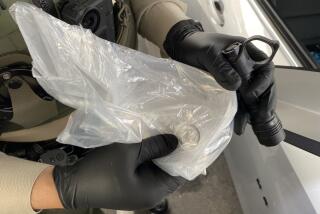Go Ahead, Just Try to Disappear
- Share via
As her daughter enjoyed a weekend road trip, Donna Butler sat back home 120 miles away at her personal computer and watched a blue dot tick slowly across the screen.
But not slowly enough.
“They were going 85 on the interstate where the speed limit is 70,” said Butler, who interrupted 17-year-old Danielle’s getaway to let her know, “ ‘I will personally come up there and drive you home.’ ”
It would have been easy to find her. Whenever Danielle is away from her central Florida home, her mobile phone uses a global positioning system to transmit her precise location, which her mother can track online.
Developed originally as a military tool, GPS is used widely by drivers, hikers and boaters to figure out where they are. A new generation of relatively cheap GPS-equipped devices can tell others too -- allowing people for the first time to keep constant tabs on their rebellious teens, wandering spouses or loafing employees.
That prospect comforts mothers like Butler, but it concerns some who see ever more powerful and invasive technology eroding a sense of personal privacy.
“If your supermarket offers you the chance to take a few cents off a loaf of bread in exchange for tracking every purchase you make with one of their cards, you do it,” said Jonathan Zittrain, co-founder of the Berkman Center for Internet and Society at Harvard Law School.
“TiVo quietly makes note of your TV viewing habits. Will we be willing to carry a GPS locator so we can order a pizza with the push of a button and know it’s on its way right to us?”
Although GPS was added to cellphones so that 911 emergency calls could be tracked, 15 million Nextel Communications Inc. subscribers can now buy the locator service for personal or business use. Next year the approximately 23 million Sprint Corp. wireless users will be able to sign up. It costs about $15 a month to turn on the service.
Among the first to sign up was James Kinney, to keep track of workers at his Kinney Construction Inc. in Orange. His employees are required to carry the phones during the workday.
Shortly after handing out the phones last year, office manager Kristy Collins was demonstrating the system for a supervisor.
“We looked at the map on the computer that showed all the little dots where a crew was working a job,” Collins said. “But one dot was way over in another spot. The guy was at home instead of on the job.”
Management professor Lucas Introna, who specializes in workplace surveillance issues, said GPS tracking provided just enough information to breed discontent.
“In an office or a factory situation, a manager who might walk by has access to a whole range of situational information,” said Introna, who teaches at Lancaster University in Britain. “But when a worker far away knows that every move they make is monitored by someone -- without information about just what they are doing -- it takes on a punitive sense.”
Kinney didn’t disagree. “The guys hate it,” he conceded, even though the worker caught at home was able to show that he had gone to pick up materials needed for the job.
GPS, which uses a network of orbiting satellites to fix precise locations on Earth, was developed for the military. But as soon as the first satellite in the system was turned on in 1978, academics were testing its capabilities. By the early 1980s surveyors were using GPS in their work.
GPS has proved to be one of the most popular consumer uses of space technology. So far this year, nearly 3.9 million new cars came with factory-installed GPS navigation systems, according to research company CMS Worldwide. In 2008, that number is forecast to reach 6.5 million.
Hand-held GPS units for hikers, bicyclists and runners have steadily fallen in price and are now available for about $100.
Satellite tracking for the non-military market got its first big boost in 1988 when then-fledgling Qualcomm Inc. of San Diego introduced a system that allowed fleet managers to spot where their vehicles were anywhere in the country.
Consumer GPS tracking gear was soon to follow, popping up in shops and eventually on websites that often had “spy” as part of their names.
“I would say that 60% of my sales are to women who say, ‘I think my husband is cheating on me,’ ” said Greg Shields of Cincinnati, who operates the Spygear Store on the Web and sells a $500 unit designed to be magnetically attached to the bottom of a vehicle. “The rest are men who want to track employees.”
The unit is removed after several days and plugged into a personal computer to produce a map that can be zoomed down to the street level to show not only where the vehicle has been but also its speed and all starts and stops. Shields also sells a $1,200 device that sends the signals back to a personal computer for real-time tracking.
Customers, including a woman in Phoenix who recently bought a device from him, have been satisfied with the operation of the units if not the results.
Shields said the woman told him, “My husband was saying he was working late and it turned out he was going to the Holiday Inn. Now he’s living at the Holiday Inn.”
In 2002, Wherify Wireless Inc. of Redwood Shores, Calif., debuted a GPS wrist device -- which looked like a gaudy digital watch -- for tracking children. The company declined to say how many it had sold, but one was bought by Zittrain.
“My dog had gotten lost a couple times,” he said. “I put it on her collar.”
Cellphones entered the picture in 2001, when the Federal Communications Commission ordered mobile telephone carriers to add technology to handsets that pinpoint their location. The idea was to make it easier to track 911 emergency calls, which increasingly come from cellphones.
Some carriers adopted technology that used signals from cellphone towers to determine location. Others, including national carriers Verizon Wireless, Sprint and Nextel, went with GPS.
Although Nextel is the only national carrier to offer GPS services, all new phones sold by these carriers are GPS- equipped. By the end of 2005, companies that chose GPS are supposed to have converted at least 95% of their subscribers to the phones, although some carriers have indicated they will ask the FCC for an extension.
Even without the government regulations, GPS probably would have made its way into cellphone handsets eventually, said James Dempsey, executive director of the Center for Democracy and Technology in Washington.
“The commercial value of location services is so valuable, we would probably still be seeing a proliferation of them anyway,” Dempsey said. In addition to locator services, Nextel offers a function that gives driving directions. A Sprint spokeswoman suggested that one day users could buy a movie ticket and then automatically get directions to the theater.
Joe Betar just wanted to know where his 13-year-old daughter was.
The owner of a Utah car dealership had already raised two teenagers. “There were numerous nights when they were not home when they were supposed to be,” he said. “We would lie awake worrying about them. I ended up driving around, looking for them.”
So when his daughter wanted a cellphone, Betar picked one out -- with a subscription for GPS tracking. He didn’t tell her about it.
“If she knew, she might be tempted to just leave it in some location,” Betar said.
For Mark Frankel of the American Assn. for the Advancement of Science in Washington, that crosses a line. “If a parent gives a teenager one of these phones and tells them, ‘It has the ability to track you,’ it can carry the message ‘We are concerned about your safety,’ ” said Frankel, who is director of the group’s Scientific Freedom, Responsibility and Law Program.
“But it troubles me that someone would be tracked without their knowledge, outside of a criminal situation. When the child finds out about it, and there’s a good chance they will, it’s a betrayal. It carries the message ‘I have no trust in you.’ ”
Frankel said that part of being a teenager “is to develop an independent personality. And part of that is privacy.”
Tom Pratt has no such qualms. He told his two children about the GPS units in their mobile phones. But he said being a kid today is far more dangerous than when he grew up on Long Island in New York.
“Back when I was a kid, on a Saturday you left home when the sun came up and then came back home when it was time for dinner,” he said. Now he worries about his 12- and 13-year-olds, and he pitched the GPS unit to them as a way to give them more freedom.
“We told our son, ‘You don’t have to call home every hour anymore,’ ” Pratt said.
Danielle Butler, whose road trip was interrupted with the warning about speeding, is practically an adult. But she said she hardly thinks about the phone that allows her to be tracked. “I don’t mind,” she said. “I have nothing to hide.”






